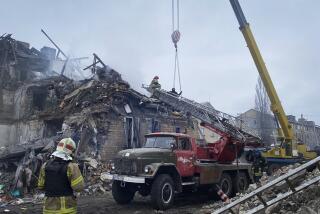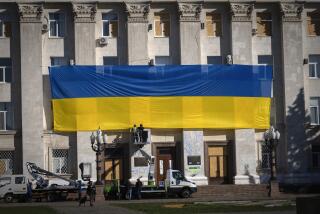Eastern Ukraine holds separatist referendum

Los Angeles Times global affairs reporter Carol J. Williams and video journalist Ann Simmons discuss the current situation in Ukraine, where separatists in the country’s east are calling on Russia to absorb the region.
Some residents of this eastern Ukrainian city voted for independence Sunday in expectation of soon having their region annexed by Russia.
Others cast “yes” votes as what they considered a first step toward demanding more regional autonomy while remaining part of Ukraine.
Still others, frustrated by rising prices and a withered national currency, voted in favor of the vaguely worded referendum out of conviction that they can depend on neither Kiev nor Moscow to resolve their political and security problems.
Only those supportive — or at least tolerant — of the interim national leadership in Kiev opposed the referendum, and rather than vote “no,” many simply stayed away from the polls.
At a midnight news conference, an election officer told reporters that the initial ballots counted showed nearly 90% in favor of the controversial referendum brought by armed pro-Russia separatists in the Donetsk region. He did not say how many ballots had been tallied.
Final results of Sunday’s vote in the Donetsk and Luhansk regions aren’t expected until late Monday at the earliest. The ballots must be counted by hand after being brought to this regional capital.
But fear-mongering and propaganda motivated a large turnout and gave what is likely to prove a convincing majority in support of rejecting rule from Kiev after deadly confrontations over the last two weeks between government forces and separatists occupying a dozen towns and cities.
Violence continued to roil the region during and after the controversial referendum. At least one person was shot to death in the Donetsk regional town of Krasnoarmeysk, where government troops reportedly opened fire on militants angered by the Kiev forces’ interruption of voting Sunday afternoon. Denis Pushilin, self-proclaimed leader of the “People’s Republic of Donetsk,” said that the victim was a civilian and that separatist election organizers barely escaped the attack, Russia’s Itar-Tass news agency reported.
Scores of deaths during confrontations in Odessa on May 2 and in Mariupol on Friday appear to have spurred the massive turnout Sunday, despite the prospects of the results being rejected as illegitimate by the international community. Even Russian President Vladimir Putin, seen as having instigated the unrest in Ukraine’s east, had urged the separatists to postpone the vote to give more time for diplomacy to resolve the crisis.
U.S. and European leaders warned the Kremlin and the pro-Russia militants that they were inflaming already volatile passions in this deeply divided region long dominated by Moscow.
The single referendum question was simple in its wording but vague in its intent: Do you support the act of independence for the People’s Republic of Donetsk?
Some, like medic Ninel Lvovich, said they voted “yes” out of despair.
“We want to decide our own affairs. We don’t want America or Europe coming here, and I don’t think we can count on Russia’s help,” Lvovich said, lamenting shortages of medicines and supplies at the government hospital where she works.
Agricultural entrepreneur Yevgeny Kremnyev of militant-occupied Svyatogorsk voted for independence with the understanding that an autonomous republic will remain part of Ukraine but with more power to decide political, economic and foreign affairs issues. He said he intended to cast a ballot in the May 25 Ukrainian presidential election, but he hadn’t yet identified a candidate he trusted.
For many who voted Sunday, like businessman Sergey Makarenko from the embattled city of Slovyansk, the balloting was a prelude to annexation by Russia.
“I used to be in favor of a united and independent Ukraine but not since [interim President Oleksandr] Turchynov came to power,” Makarenko said after voting. “All the leaders of Ukraine in its 23 years of independence should be rounded up and put in prison.”
Frustration with the unreformed economy, rampant corruption and antiquated industry of Ukraine’s Rust Belt fueled much of the vote against central rule from Kiev. But diverse expectations of the independence declaration portend more disharmony for the largely Russian-speaking eastern and southern areas historically integrated with Russia.
At the ravaged Donetsk regional government headquarters, separatists in grimy camouflage uniforms wielding guns, clubs and crossbows stood guard at their barricades of tires and barbed wire, vigilant against any move by Kiev-dispatched forces to retake control of the city center. Although the gunmen occupy only the one building and the Kiev loyalists they ousted a month ago continue to run the region from temporary quarters a few blocks away, there is a sense that the pro-Moscow militants can’t be flushed from their stronghold without massive force and loss of life.
Opinion polls conducted in April by both foreign and domestic agencies showed a sizable majority — at least 70% even in the eastern regions — opposed to secession from Ukraine or union with Russia. But the recent violence has turned many against the Kiev government that took power after a three-month rebellion ousted President Viktor Yanukovich, a Kremlin ally now taking refuge in Russia.
“After Odessa and Mariupol, everyone should run to vote for independence. All Donetsk people want out from the Kiev government. We’re all afraid now,” said a 70-year-old retired teacher in a heavy lavender wool dress despite the unseasonably warm day. Like many approached after casting their ballots, she refused to give her last name out of fear of government reprisal.
Supporters of the interim government were hard to find in this city of about 1 million, despite the pro-Russia gunmen’s limited physical control. Teacher Lyudmila Nadoka, 56, said she skipped the vote because the seizure of the Donetsk government center had put an ominous face on the leadership of her city.
“For our 23 years of independence, I’ve always taught my pupils to be patriots. I don’t even know what to say when I enter the classroom now,” the educator said.
At a shopping center on the outskirts of Donetsk, only one of dozens of shoppers approached about the referendum said he had stayed away from the polling places because he considered the ballot “illegal.”
“I don’t like these guys. I don’t like where this is going at all. I don’t want to kill anyone, so why do so many people have guns?” said design engineer Dmitri Postolovsky, 33. He noted that the balloting was unsupervised and entirely lacking in automated tabulation.
Central election commission director Roman Lyagin said more than 69% of the Donetsk region’s 3.5 million eligible voters had cast ballots by 4 p.m. He disputed reports by foreign media and Ukrainian government forces that cars had been stopped at roadblocks and found to be delivering already-filled-out ballots in favor of independence.
At a news conference in the squalid Donetsk Republic headquarters, where the stairwells connecting 11 floors looted of furniture and office equipment were covered with cigarette butts and scraps of discarded food, Lyagin was asked whether the region would participate in the May 25 presidential election.
“That would make no sense at all for the independent Donetsk Republic to take part in a Ukrainian government election,” he said.
More to Read
Start your day right
Sign up for Essential California for news, features and recommendations from the L.A. Times and beyond in your inbox six days a week.
You may occasionally receive promotional content from the Los Angeles Times.







